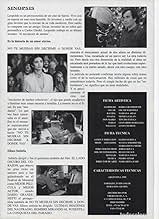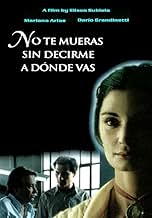Ne meurs pas sans me dire où tu vas
Titre original : No te mueras sin decirme adónde vas
NOTE IMDb
7,0/10
902
MA NOTE
Ajouter une intrigue dans votre langueIt is the fantastic story of a couple that has the chance to live for centuries loving one another because of various reincarnations.It is the fantastic story of a couple that has the chance to live for centuries loving one another because of various reincarnations.It is the fantastic story of a couple that has the chance to live for centuries loving one another because of various reincarnations.
- Réalisation
- Scénario
- Casting principal
- Récompenses
- 5 victoires et 5 nominations au total
Avis à la une
Leopoldo, (Dario Grandinetti), is a timid man in his 40s who toils away in his spare time on unsuccessful inventions. His latest project: a machine to record dreams while people sleep for later playback.
Leopoldo's life is not a happy one. The owner of a failing movie theater in Buenos Aires, he has trouble making ends meet and may soon lose his business. He long-suffering wife Susana, (Monica Galan), is unable to have children, which puts more pressure on an already strained marriage. And it doesn't help matters that Leopoldo behaves eccentrically in public places, conducting conversations with a potted plant carried everywhere as a companion.
On day Rachel, (Mariana Arias), appears. Dressed in the styles of the 1880s, she tells Leopoldo the only person who can see her -- that she is a reincarnated spirit and they have met and loved each other in different lives during the previous 300 years. The story that follows is an odd, sometimes slow, though rewarding fantasy about life, dreams, and reincarnation. Strongly recommended.
8/10
Leopoldo's life is not a happy one. The owner of a failing movie theater in Buenos Aires, he has trouble making ends meet and may soon lose his business. He long-suffering wife Susana, (Monica Galan), is unable to have children, which puts more pressure on an already strained marriage. And it doesn't help matters that Leopoldo behaves eccentrically in public places, conducting conversations with a potted plant carried everywhere as a companion.
On day Rachel, (Mariana Arias), appears. Dressed in the styles of the 1880s, she tells Leopoldo the only person who can see her -- that she is a reincarnated spirit and they have met and loved each other in different lives during the previous 300 years. The story that follows is an odd, sometimes slow, though rewarding fantasy about life, dreams, and reincarnation. Strongly recommended.
8/10
This is why I watch foreign films, because once in a while I can find a movie like this. This movie manages to take wistful and make en entire movie out of it. Even at that, I never knew what was coming next (always a good thing). The ending was not what I would have expected. And then it was the next day before I got what the entire movie was about. Oh, it already stood by itself, in my mind. But when it hit me, it was like, "Oh, wow, yeah, NOW I get it!" It's possible some may watch this and never get it - what I realized later - but I hope they do.
Reincarnation is dear to my heart, which is why I put this in my Netflix queue and then moved it to the top. There is so much you can do with reincarnation themes. And this film treats it both respectfully (not totally necessary, but nice if it happens) and explores the implications and how it might work for some (maybe for all). Few films do the latter well.
It treats love across the lifetimes warmly and at a soul level, never letting us forget that desire is part of it, but never letting that be the driver.
Whether life goes on or it doesn't, our thoughts on it and the way we treat it in movies won't make any difference. But this film does present a love story/sci-fi version that is well worth it.
I give it 10 stars, not because it is about reincarnation, but because the story is well told, has surprises, and allows our minds to get involved. We should all have an across-the-lifetimes love like Leopoldo and Rachel have in this film.
Reincarnation is dear to my heart, which is why I put this in my Netflix queue and then moved it to the top. There is so much you can do with reincarnation themes. And this film treats it both respectfully (not totally necessary, but nice if it happens) and explores the implications and how it might work for some (maybe for all). Few films do the latter well.
It treats love across the lifetimes warmly and at a soul level, never letting us forget that desire is part of it, but never letting that be the driver.
Whether life goes on or it doesn't, our thoughts on it and the way we treat it in movies won't make any difference. But this film does present a love story/sci-fi version that is well worth it.
I give it 10 stars, not because it is about reincarnation, but because the story is well told, has surprises, and allows our minds to get involved. We should all have an across-the-lifetimes love like Leopoldo and Rachel have in this film.
No te Mueras sin Decirme Adónde Vas is a very interesting movie which deals with a lot of science fiction which is not really seen much in Argentine movies, which are most usually very realistic in nature. The fact that there is a robot in the movie, invented by one of the main characters, is not far-reaching compared to the appearances of ghosts, or spirits, which we also see throughout. The use of the technology invented in the movie seems to be the way by which the two inventors find love. On the one hand, Leopoldo clearly falls in love with the lady which he consistently begins to see from the moment she appears in his dream recorder machine. This love goes so far as to improve Leopoldo's relationship with his own wife. A similar occurrence is also observed in the life of Leopoldo's friend, Oscar. After seeing the girl once loved in a dream recorded by the recently invented machine, Oscar ends up reuniting with her. The movie ends up bringing up questions of reincarnation and the ability to become a new man or woman at different stages in one's life.
There is every emotion possible found in this film. I cried, laughed, was sad, joyful, and so many other things, but most of all my soul was greatly touched. The subject of reincarnation is something very close to me and seeing it portrayed on the screen in this beautiful, emotional, magical and real way was just incredible. The story, the acting, the directing and the cinematography were so beautifully integrated. This is a masterpiece if ever I saw one. The part of the film that hit me the hardest was the scene in which Rachel encounters all the people going to be born. The fear of being born was portrayed so strongly by Mariana Arias - It is something I will never forget. As a beginning film student, this is the type of film I hope to one day make.
10srl8
Eliseo Subiela has created a movie which appeals to all audiences throughout the world. Everyone, no matter your race, age, background, can relate to the themes of life, death, and the unknown. He is trying to get across the idea that the life we live here on earth may not be as black and white as we believe or as dictated by religious ideals. Subiela uses visual imagery which the untrained eye may pass over, but at second glance, Subiela's vision is obvious. He uses the black and white tiled floor as an indicator into the psyche of his protagonist Leopoldo. As Leopoldo and Rachel are meeting for the first time, they end up in the lobby of the movie theater. The floor is a sea of black and white, starkly contrasted tiles. Subiela is showing us that Leopoldo, at this point, is stuck in the boxed ideal that nothing happens after death, we just cease to exist. He walks away from their conversation confused and watches as she walks across a crowded street, while cars drive through her body. Our eyes are drawn to the crosswalk which is black asphalt with white lines, but the lines are not complete and are not the same stark contrast of white and black; we begin to see some shades of gray. Leopoldo is open to his relationship with Rachel and learning more about where she came from and how she is able to be apart of his world as a spirit from another. Near the end of the movie, Leopoldo is visited by Pablo, again our eyes are drawn to the floor. The floor is the same black and white tile as the movie theater, but this tile is not brightly colored. The tile is dirty, broken, and is not the perfect black and white pattern. Subiela shows us through the use of color and pattern, how the protagonist is transformed through his encounters that will forever change his vision of the relationships in his life and how the cycle of life is so much more than birth, life, and death.
Le saviez-vous
- ConnexionsFeatures Un chien andalou (1929)
Meilleurs choix
Connectez-vous pour évaluer et suivre la liste de favoris afin de recevoir des recommandations personnalisées
Détails
- Date de sortie
- Pays d’origine
- Site officiel
- Langue
- Aussi connu sous le nom de
- Don't Die Without Telling Me Where You're Going
- Lieux de tournage
- Sociétés de production
- Voir plus de crédits d'entreprise sur IMDbPro
- Durée
- 2h 10min(130 min)
- Couleur
- Mixage
Contribuer à cette page
Suggérer une modification ou ajouter du contenu manquant



























